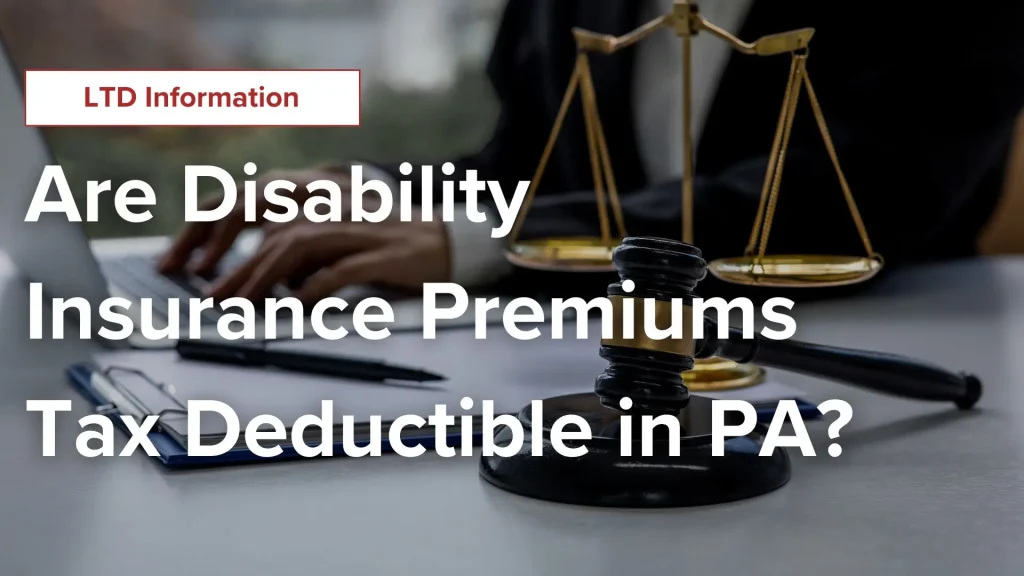Posted on Sunday, August 18th, 2024 at 9:00 am

If you’re considering purchasing disability insurance or already have a policy, you may be wondering about the tax implications. One common question our long-term at Capitan Law hear is whether disability insurance premiums are tax-deductible in Pennsylvania. The answer isn’t always straightforward, as it depends on various factors, such as the type of disability insurance and who pays the premiums.
Understanding Disability Insurance
Disability insurance provides income replacement if you cannot work due to an injury or illness. There are two main types:
- Short-term disability insurance (STD): Typically covers a portion of your income for a few months to a year.
- Long-term disability insurance (LTD): Provides coverage for extended periods, often until retirement age.
Are Individual Disability Insurance Premiums Tax Deductible?
If you purchase an individual disability insurance policy with after-tax dollars, the premiums are generally not tax-deductible in Pennsylvania or the federal level. This applies to both short-term and long-term disability policies.
While this might seem disadvantageous initially, there’s a silver lining: when you pay premiums with after-tax dollars, any benefits you receive from the policy are typically tax-free. This can be a significant advantage if you ever need to claim benefits, as you’ll receive the full amount without setting aside a portion for taxes.
Employer-Sponsored Disability Insurance
The tax implications become more complex when it comes to employer-sponsored disability insurance:
If your employer pays the premiums, they are not considered taxable income. However, any benefits you receive will be taxable. If you pay the premiums with pre-tax dollars, you don’t pay taxes on the premium amounts. Still, like employer-paid premiums, any benefits received will be taxable. If you pay the premiums with after-tax dollars, you’ve already paid taxes on this money. As a result, any benefits you receive will be tax-free.
Some employers offer a choice between paying premiums with pre-tax or after-tax dollars. While using pre-tax dollars may seem appealing due to the immediate tax savings, consider the potential long-term implications if you ever need to claim benefits.
Business Owners and Self-Employed Individuals
If you’re a business owner or you are self-employed in Pennsylvania, you may have some additional considerations:
- Self-employed individuals: You generally cannot deduct premiums for policies that replace your income. However, you may be able to deduct premiums for overhead expense disability insurance, which covers business expenses if you become disabled.
- S-Corporation owners: If you own more than 2% of an S-Corporation, the rules are similar to those for self-employed individuals.
- C-Corporation owners: Your corporation may be able to deduct the premiums as a business expense if it’s providing disability coverage as a benefit to employees, including owner-employees.
Qualified Long-Term Care Insurance
While not exactly the same as disability insurance, qualified long-term care insurance premiums may be tax-deductible. At the federal level, these premiums can potentially be deducted as medical expenses if you itemize deductions and your total medical expenses exceed a certain percentage of your adjusted gross income.
State-Specific Considerations for Pennsylvania
While Pennsylvania generally follows federal tax rules regarding disability insurance premiums, you must be aware of state-specific programs or tax credits that might apply to your situation. For instance, Pennsylvania offers property tax and rent rebates for eligible elderly or disabled residents, which could provide some financial relief even if disability insurance premiums themselves aren’t deductible.
The Importance of Professional Advice
 Tax laws can be complex and are subject to change. It’s important to consult a tax professional or an experienced disability insurance attorney for advice tailored to your situation. At Capitan Law, we focus our practice on helping clients obtain the disability insurance benefits they paid for. We can provide insights into how your policy affects your financial picture.
Tax laws can be complex and are subject to change. It’s important to consult a tax professional or an experienced disability insurance attorney for advice tailored to your situation. At Capitan Law, we focus our practice on helping clients obtain the disability insurance benefits they paid for. We can provide insights into how your policy affects your financial picture.
Contact Capitan Law Today
Remember, your health and financial security are paramount. While tax considerations are important, they shouldn’t be the only factor in deciding whether to purchase disability insurance. Having the right coverage in place can provide invaluable peace of mind and financial protection if you cannot work due to a disability.
While individual disability insurance premiums are generally not tax-deductible in Pennsylvania, the tax treatment of employer-sponsored policies can vary depending on how the premiums are paid. If you’re struggling with a disability insurance claim or have questions about your policy, don’t hesitate to contact the experienced Philadelphia long-term disability insurance attorneys at Capitan Law. We’re here to help you understand your rights and options. Contact us online or call us today at (267) 419-7888 for a free consultation.
Related Posts:
What Is Voluntary Long Term Disability Insurance?
What Are Residual Disability Benefits?
Who Pays Health Insurance While on Long-Term Disability?
Do I Need Long Term Disability Insurance in Pennsylvania?
What Is the Cost of Long Term Disability Insurance in Pennsylvania?